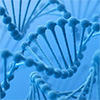| Jun 02, 2023 |
|
|
|
(Nanowerk News) Unlocking the potential of laboratory-crafted DNA, known as synthetic DNA, holds the key to groundbreaking advancements across multiple domains, according to quantum biologists from the University of Surrey.
|
|
Unlike naturally occurring DNA, synthetic DNA could allow scientists to engineer fresh genes or enhance existing ones, opening doors to transformative possibilities in medicine and biotechnology. Synthetic DNA could also sustain Darwinian evolution, paving the way for exciting advancements in the understanding of genetic systems.
|
|
In a unique study (RSC Advances, “How proton transfer impacts hachimoji DNA”), quantum biologists from Surrey investigated how protons move in Hachimoji DNA, which is a synthetic form of DNA not yet found in natural life.
|
|
Using a method called density functional theory, the team from Surrey calculated the speed of proton transfer and how it’s affected by temperature. They found that proton transfer happens more easily in Hachimoji DNA compared to regular DNA. Specifically, certain pairs of bases in Hachimoji DNA allow protons to move 30% faster than in regular DNA. This suggests that Hachimoji DNA might have a higher chance of mutations compared to normal DNA.
|
|
Dr Louie Slocombe, lead researcher on the project at the University of Surrey commented: |
| “The exploration of Hachimoji DNA and its distinctive properties presents exciting prospects for synthetic biology and genetic research. Our study provides invaluable insights into the dynamics of proton transfer within Hachimoji DNA, shedding light on its potential implications for mutation rates.
|
|
“This knowledge has the potential to guide future advancements in DNA engineering and expand our comprehension of genetic systems here on our planet and beyond.”
|
|
Hachimoji DNA is synthetic DNA created in a laboratory that expands the genetic code beyond the usual four letters (A, T, C, G). It incorporates four additional building blocks (Z, P, S, B), allowing for more diverse possibilities in genetic information and, crucially, opening up new avenues in genetic research, synthetic biology, and nanotechnology. Hachimoji DNA is seen as a promising candidate for engineering organisms with unique capabilities and for developing innovative drugs.
|
